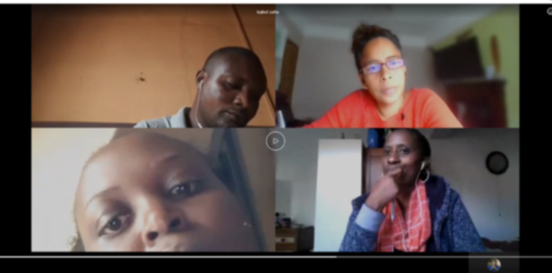Leona Vaughn, 8th July 2020
This research project ‘COVID 19 and Racialised Risk Narratives in South Africa, Ghana and Kenya’, was devised in a way that tried to reflect my personal and professional commitment to anti-colonial research.
The ambition to not only ‘decolonise’ how we design and deliver research (make it less Euro-centric) but also make it actively anti-colonial throughout the research process (resist colonial practices and logics), is one which underpins my design of the consultation research undertaken for the UK Collaborative on Development Research (UKCDR) and the resulting guidance on Safeguarding in International Development Research.
This guidance was designed to help the research community (researchers in institutions, civil society and independent consultants) “to anticipate, mitigate and address potential and actual harms in the funding, design, delivery and dissemination of research”.
So I applied this ‘safeguarding’ approach to a number of key areas of this research project:
1. Knowledge production
2. Equitable partnerships
3. Co-designing research
4. Co-delivering research
5. Co-analysing research
6. Co-authoring and disseminating research
This project represented an opportunity for exploration of how the racial stereotypes of the West relating to the risk and prevention of COVID 19 infection, affected Black people on the African continent. It was designed to place African voices at the heart of the research, in a bid to break the colonial trend for extractive types of research (Global North researchers gaining information from the Global South and writing about it with no Global South collaboration). The project was discussed with potential partners in South Africa, Ghana and Kenya at the very earliest idea stage.
We worked together on the project proposal and negotiated what was realistic in terms of time commitment and deliverables in the 3 month time frame.
Within this proposal we also had full transparency and discussions on equitable rates of pay and how payment needed to happen in relation to timing, to ensure partners were not financially harmed by avoidable delays.
The methodology was discussed to ensure achievability during a worldwide lockdown – for example, that it wasn’t going to place partners in any physical danger and was manageable in relation to the need for consistent wi-fi or power, when many countries were experiencing outages.
As a result of these conversations, I built into the funding application a cost for external hard drives, so that partners could ensure they had saved their work even if electricity or Wi-Fi failed. I also ensured that partners could access the university online library to address the lack of access they may experience when relevant articles or newspapers needed for the research were behind paywalls/incurred a cost.
In anticipation of the ethical dilemmas which could arise if assumed hierarchies were not addressed (e.g. academic/non-academic, Northern/Southern), we had an open discussion as a team to ensure everyone was comfortable. This was a way to acknowledge power dynamics explicitly, rather than just assume that partners would be at ease with identifying and negotiating any dilemmas which arose.
From the beginning, everyone knew their role and what they contributed We didn’t have any ‘expertise’ hierarchies, but rather a discussion on how we draw on everyone’s strengths and build knowledge within the team. This established mutual respect throughout the collaboration.
In my first blog I reflected on my role and privilege, and the potential for a North/South colonial approach to creep in to our project without proper consideration of how power dynamics appear. I was very upfront about these concerns. We didn’t just talk about it, we took some concrete action. The weekly team meetings were chaired in rotation by the Africa-based partners. If one partner had problems with connection or electricity, due to their location or shortages in their area, we rearranged a time when everyone could attend. We all placed our work on a shared drive for everyone to feedback on – not just the academics ‘marking’ partners work. We collectively analysed the data we collected, checking out if our perspectives or interpretations were in step with those partners with local knowledge and understanding. We talked early on about the need for safeguarding partners from negative comeback, to acknowledge that it may be a politically sensitive issue to write about in some contexts.
We set up this website, which can be a standalone entity used by the research partners at any point, and is accessibly written for an international audience. This includes space to place all of our data (archive) on here when the project is over. This will mean that other researchers in the regions can analyse what we found at any time in the future.
Our analysis report is being written collectively and co-authored, but partners in each country are single-authoring their country reports to increase their visibility and give them a resource to use in their work locally. This will also help with disseminating the findings appropriately.
We started to seek out opportunities for publications, conferences and future funding from the outset of the project. We wrote abstracts collectively. We asked for the conferences we submitted to, to allow for virtual presentations so that all partners could attend irrespective of the possible barriers of cost or location.
This journey has been one of mutual learning – no single one of us had all the answers to how we guarded against power imbalances.
Instead we acknowledged them as they appeared, big and small, discussed them with empathy and worked through how to change the dynamic.
Constantly.
That was the biggest lesson about properly ethical and anti-colonial work. We have to keep actively doing it.
Even when its uncomfortable or outside of our professional cultural norms and traditions.

2 thoughts on “Can Research be ‘Anti-Colonial’?”